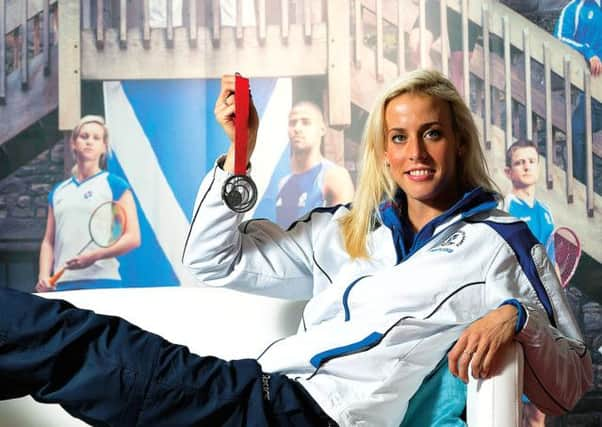Glasgow 2014 leaves legacy that will always endure


On the penultimate day of the Commonwealth Games, when even the weather is weary with the early heatwave of the opening weekend now dissolved into a steady drizzle, the word is apt: “Stoatir: something or someone fantastic.”
Few, if anyone at all, would demur that Glasgow has delivered a 20th Commonwealth Games that has been anything less than a stoatir. In fact you’d have to hurl a hammer or throw a javelin as far as George Square to find Hannah Joyce, the 18-year-old high jumper, who like all Australians has her own word for the games: “It’s been stonking.” A competitor with Team Australia, Hannah said the Hampden roar, retrofitted like the stadium from football to a vocal appreciation of track and field, helped lift her to a personal best. “They just kept cheering and cheering and cheering and I’m not even from their country.”
Advertisement
Hide AdAdvertisement
Hide AdShe has not been alone. Almost every athlete interviewed has spoken of the warmth of the crowd, with some of them greeted when they least expect it. ScotRail may have focused on safely delivering 1.1 million people to the 13 different Games venues, in the biggest public transport operation in Scotland’s history, but they’ve also achieved it with a sense of humour. Any athletes passing through Central Station have been surprised to have their sporting achievements announced over the PA system triggering spontaneous cheers and applause. As one girl tweeted: “Loved the shout out for all the athletes! Great job!” While station attendants have led queues in a chorus of ‘Singing in the Rain’.
Yet all good things must come to an end and in Glasgow yesterday there was a sense of savouring the moment regardless of how sodden. In Central Station Wendy Hardy was trying to pry Emily, her three-year-old daughter away from Clyde, the thistle Games mascot, to whose legs she stoically clung. “We’ve been watching it all on TV and it just looked fantastic,” said the 32-year-old administration officer from Port Glasgow. “We wanted to come up and spend the day before it finished.” In the vast tented merchandise shop erected in George Square business was brisk with last-minute shopping for souvenir t-shirts and hooded tops, tartan blankets and cagouls. All of the 46,000 cuddly Clydes have sold out, leaving only his outsized edition, too pricey for most at £100.
This evening it will all be over. More than 6,500 athletes from 71 nations will have successfully competed in 17 sports before a live audience of over one million people as well as tens of millions more watching on television around the globe. Team Scotland has triumphed with a record haul of 52 medals, 19 gold, 14 silver and 19 bronze. The gap between the Games and its par-athletic partner has never been narrower as a result of Glasgow’s landmark insistence that disabled athletes compete in tandem, instead of being politely banished till the end of the competition.
For Lord McConnell, the former first minister of Scotland who helped secure the games for Glasgow, it was watching a Kenyan athlete roll in a wheelchair to the edge of the pool at Tollcross then slip in, revealing that she had no legs, that remains one of the stand out moments of the past ten days. As he explained: “She swam a great race and the response she got from the crowd, the cheers was overwhelming. She’d travelled all this way to compete and the response said everything good about sport and humanity.”
Yet tomorrow night, as the fireworks fade and the baton is passed to Australia’s Gold Coast, the next word to be chalked up on the blackboard will be: “Legacy”. Many will ask what does Glasgow take away from these golden days and it is important to separate the concrete from the numinous, the solid wins from the maybe-next-times. The city’s successful delivery of such a huge event will further inflate its rising reputation as a host of international events and conferences, while the physical remains, the Sir Chris Hoy velodrome and Emirates Arena are public assets and the deprived east end of the city will benefit from welcoming 15,000 new residents into the new homes of the athletes village.
Hopes that a generation of children will be inspired to take to the track, get on their bike, or dive straight in to competitive sport are just that. Although Sandra Wallace, a netball teacher and her daughter, Rebecca would beg to disagree. After watching the netball Sandra said: “It’s inspired me to whip my school team into shape.”
No-one should be, nor I believe actually is, under the illusion that the spectacle of friendship and sport witnessed over the past ten days will be a magic bullet or javelin that deflates the city’s chronic problems with poverty and poor health. However it can be said with certainty that filling the city centre with people in track suits – until this month the daywear of choice of the unemployed – people whose goal has either been to strive for physical excellence in the case of the athletes – or to make everyone’s day a little better, in the case of the legions of volunteers has done no harm and been an example to us all. We will miss being asked to “high five” a big foam fingered hand on the way to work.
Outside Poundstretchers on Sauchiehall Street a middle-aged woman is standing in the rain singing Memory from Cats: “Daylight, I must wait for the sunrise, I must think of a new life, and I mustn’t give in.” It’s a melancholy moment for all who have bounced along in the wake of an event of a lifetime, but the emotional antidote is administered a half a mile further on where John Kerr, a retired bus driver is greeting visitors at the Clydeside: “We did it, we pulled it off and everyone has been great.”